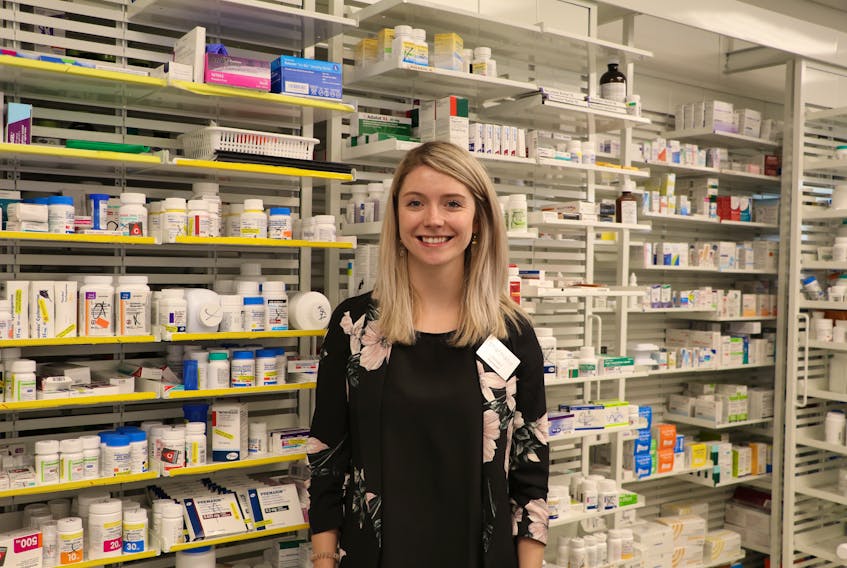Recent survey results show that while most parents are diligent about staying on top of their children’s vaccinations, they don’t consider their own vaccines a priority.
Lindsay Barbour, a pharmacist at the Dominion store in C.B.S., says vaccinations are not something most adults think about for themselves.
“For children in school there is a system in place for that, and so you know what (vaccinations) your children are getting,” Barbour said. “But for adults that’s not really there. Unless you think about going to look for the information, or you hear from somebody that you should look into it, you just might not be aware of it. It is not something that adults think about the same way for themselves as they do for their kids.”
The survey conducted by Leger Marketing shows that more than half of Atlantic Canadian adults (51 per cent) admit they can’t remember which vaccinations they’ve had, while only 42 per cent say they even know which ones the Public Health Agency of Canada recommends. The Public Health Agency of Canada has also warned that vaccine coverage among Canadian adults is nowhere near as high as it should be — less than 10 per per cent were up-to-date on their adult immunizations (based on a 2014 report).
Related story:
Be sun safe: Pharmacists’ Association of N.L.
Barbour said the lack of awareness is concerning. She said most adults don’t seem to know what vaccines they should be having.
“With adults, too, often some people have so many other issues going on that it just falls through the cracks,” she said. “On the other hand, if you are healthy, you don’t think you need to be thinking about vaccinations.”
Barbour said it is important to raise awareness that vaccines are just as important for adults, as they are for children, to prevent potential serious illnesses.
“For adults it could be something that maybe they missed, or didn’t receive as a child. It could also be something they did get when they were younger but now they need a booster of. A good example of that would be the tetanus vaccine that you should update every 10 years. I think a lot of people don’t know that.
“There are diseases that you become more at risk for as you age, that you wouldn’t have been vaccinated for when you were younger. One of those is the HPV vaccine (human papillomavirus that can cause certain cancers and other diseases). While that is publicly funded in schools now, there are lot of younger adults who missed out on that.
“There’s also the pneumonia vaccine, which is recommended for people who have chronic illnesses and all adults over the age of 65 whether healthy or not, and the shingles vaccine. That one is really picking up pace. We are seeing more people get that vaccine right now. Anyone who has ever had chicken pox is at risk of developing shingles later in life. It’s the same virus reactivated and it can be really painful, and if not treated in time, can cause complications and pain that can last months and years beyond. Unfortunately, it’s not covered by a lot of insurances but I find people pay for it because they knew someone who had it and they don’t want to get it themselves. I think one in three people will get shingles and age is the biggest risk factor for that. So being vaccinated against it is one of the best ways to reduce that risk.”
Barbour said that adults appear to most become aware of the importance of vaccines when they plan to travel outside of Canada. In this case, the most common vaccinations are against hepatitis A and hepitis B, but there are others.
“The important thing to remember there is that if you are travelling somewhere outside of Canada, it is important always to check and make sure that you’re going to be vaccinated for whatever is applicable for that area,” she said.
Barbour said people can get information about vaccinations from their family doctor or from pharmacists.
“Pharmacists are a great resource and a great place for people to start to get information on vaccinations,” she said. “In any one profession or area, it’s hard to catch everybody. We are trying to do our part. I’m sure family doctors, it is something they bring up with patients, but there are people who don’t have family doctors or don’t see their family doctors that often, so there needs to be a way for them to get the information, maybe some sort of online campaign.”
The Leger survey also found that about a quarter of the adults surveyed put off getting vaccinated because it is inconvenient. Some said they would have to take time off work to get a doctor’s appointment, get the prescription filled and then go back to the doctor to get the injection.
One way to alleviate that inconvenience, suggested Barbour, is to get the pharmacist to perform the injection — a fee of about $20 is charged.
“Pharmacists can offer injections at the pharmacy. You still need a prescription, but pharmacists are here evenings, holidays and weekends, so it sort of takes a little bit of the inconvenience factor out of it,” she said.
Another reason some people put off or don’t get vaccinated is because of costs — not all vaccines are covered by insurance.
Barbour noted that could be a factor for people on limited income. The shingles vaccine, for example, without insurance coverage costs about $140 per dose (two does required). Hepatitis A is about $60 per injection (three doses required).
“Our population is aging, so being a pharmacist we see a lot of patients who do end up contracting these diseases that are preventable by vaccines,” she said. “While it is not 100 per cent going to keep you from getting these things, vaccinations are the best way to help minimize the risk for developing a lot of these diseases. And you do become more at risk when you get older. “









